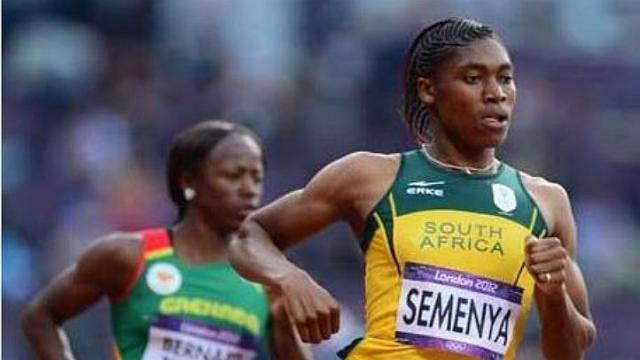Athletes who faced gender controversies

South African runner Caster Semenya was subjected to a series of humiliating tests due to questions being raised about her gender after she won gold in the women’s 800 metres at the 2009 World Championships. IAAF.ORG
SINGAPORE–In a controversial move on Tuesday, the Philippines demanded that South-east Asia Games organisers carry out a gender test on Indonesian women’s volleyball player Aprilia Santini Manganang.
Philippines coach Roger Gorayeb singled out Manganang because of her appearance and powerful physique.
SEA Games organizers Singsoc rejected the appeal on Wednesday after reviewing the documents submitted by the Indonesian volleyball team.
Manganang, 23, was cleared to compete in the volleyball tournament, which began on Wednesday at the Sports Hub.
Back story: PH execs ask SEA Games to conduct gender test on Indonesian volley player
Gender testing in sports has long been a controversial topic. The tests can be humiliating and women who do not conform to perceived feminine norms are often judged based on their physical appearance alone.
Fifa, the world football ruling body currently entrenched in a corruption scandal, requires teams participating in the ongoing Fifa Women’s World Cup to sign a declaration guaranteeing that players nominated to the World Cup are “of an appropriate gender”.
According to CBC News, this has been a requirement since 2011.
Fifa said: “It lies with each participating member association to ensure the correct gender of all players by actively investigating any perceived deviation in secondary sex characteristic.”
It is not clear how verification takes place.
Here are four other athletes who faced gender tests and controversies.
Caster Semenya
The South African runner won gold in the women’s 800 metres at the 2009 World Championships with a time of 1:55.45 in the final.
Due to questions being raised about her gender, she was subjected to a series of humiliating tests.
The International Association of Athletics Federations (IAAF) – track and field’s governing body – confirmed that Semenya had agreed to the sex-testing process.
On July 6, 2010, the IAAF confirmed that Semenya was cleared to continue competing as a woman.
Results of the gender testing were never officially released for privacy reasons.
Semenya went on to win silver medals at the 2011 World Championships and the 2012 Summer Olympics, both in the 800 metres.
Dutee Chand
The 19-year-old Indian athlete was disqualified just days before the start of the Commonwealth Games in Glasgow in July 2014 after tests showed elevated levels, above IAAF guidelines, of naturally occurring testosterone in her blood.
She has not been allowed to compete since and is currently appealing her ban at the Court for Arbitration for Sport in Lausanne, Switzerland. Her legal team will argue the ruling is discriminatory and flawed.
There is currently no similar assessment for male athletes.
“It’s so cruel. God has made me the way I am. I don’t want to change anything and I also don’t want to give up sports,” Chand, 19, told AFP in 2014.
Santhi Soundarajan
The Indian middle-distance athlete won a silver medal in the 2006 Doha Asian Games, but failed a gender test and was subsequently stripped of her medal and banned from competing.
The results of the test, which usually includes examinations by a gynaecologist, endocrinologist, psychologist and a genetic expert, were not made public.
But reports have said that the likely cause is a condition called Androgen insensitivity syndrome, where a person has the physical characteristics of a woman but whose genetic make-up includes a male chromosome.
Humiliated after the ban, Soundarajan fell into serious depression.
In September 2007, Indian newspapers reported that she had survived a suicide attempt.
Stella Walsh
The Polish athlete set more than 100 national and world records during a distinguished career, including winning the gold for the women’s 100 metres in the 1932 Summer Olympics with a record 11.9 seconds.
The popular athlete attempted to defend her Olympic title in the 1936 Olympics but went home with the silver medal, losing to Helen Stephens of the US. Walsh clocked 11.7 seconds.
After retiring from her sports career, she accepted American citizenship and was active in a variety of Polish sport associations in America.
Controversy only arose when Walsh was tragically killed in 1980, after being caught up in an armed robbery.
An autopsy revealed she suffered from a condition called mosaicism, which meant she had both male and female chromosomes.
The examination stated that she had male genitalia.
This brought into question the the validity of her previous athletics achievements.
RELATED STORY
SEA Games organizers dismiss gender protest in volleyball














